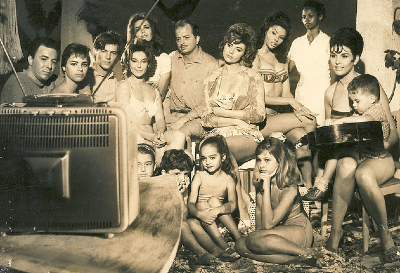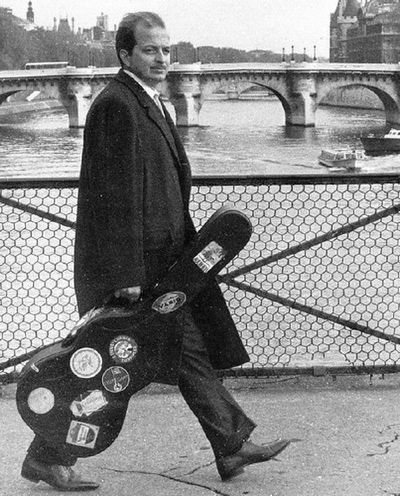LUIZ BONFÁ
|
Luiz Bonfá. As a composer and performer was an exponent of the bold, lyrical, lushly orchestrated, and emotionally charged samba-canção style that predated the arrival of João Gilberto’s more refined and subdued bossa nova style. A musician of virtuosity, subtlety, and passion, guitarist Luiz Bonfá (1922-2001) ranks among the key architects of the bossa nova sound and the greatest masters of Brazilian popular of the 20th century. Reahearsing with friend Tom Jobim. Bonfá’s style on the guitar moved away from the classical focus on melodic intricacy towards an approach Brazilian rhythms, while maintaining the poise and beauty of the classical sound. His early twenties saw a rapid development in his compositional style, which, coupled with his technical talent, gave rise to numerous popular songs, including “De Cigarro em Cigarro,” “Sam bolero,” and “Uma Prece.” From the movie Copacabana Palace, Luiz Bonfa with Joao Gilberto and Tom Jobim. A French-Italian-Brazilian fil directed by Steno. Bonfá spent the next fifteen years living on and off in the USA, going home occasionally to record or relax. During one such month off in Rio in the late 1950s, Luiz was approached by French director Marcel Camus to write a theme for the main character of his film Orfeu Negro (“Black Orpheus”), an adaptation of a Brazilian re-telling of the legend of Orpheus written by Bonfá’s friend and fellow musician Vinicius de Moraes. Bonfá composed a piece which, though not immediately liked by Camus, would become his most well-known composition. To this day, “Manhã de Carnaval” (“Morning of Carnival” or “Black Orpheus”) remain classics . Luis Bonfá worked with American musicians such as Quincy Jones, George Benson, Stan Getz, and Frank Sinatra, recording several albums while in United States. Elvis Presley sang a Bonfa composition, “Almost in Love”, in the 1968 MGM film “Live a Little, Love a Little”.
Related posts: |










